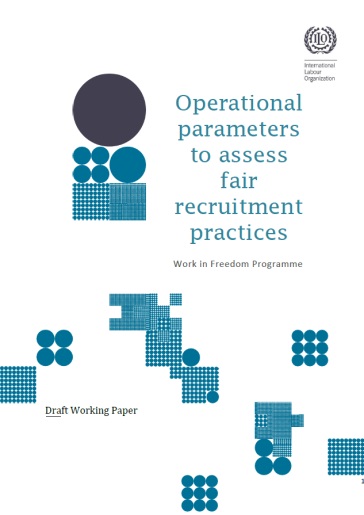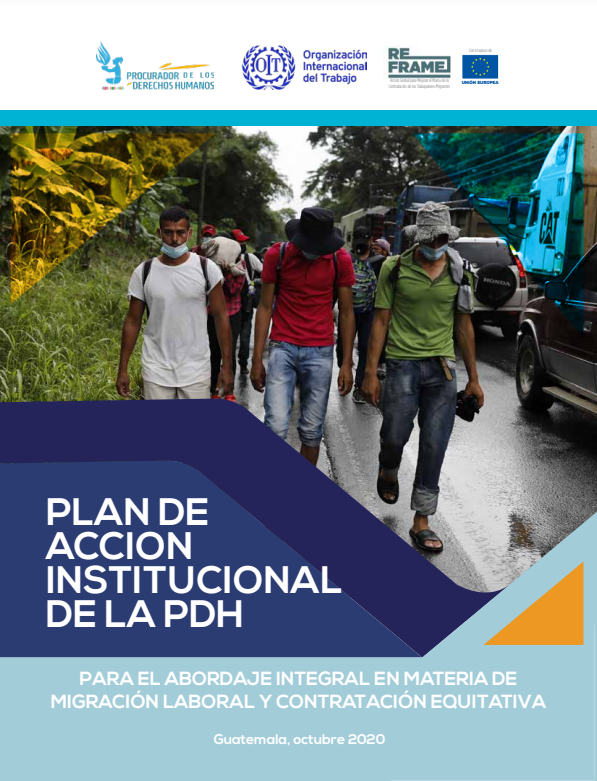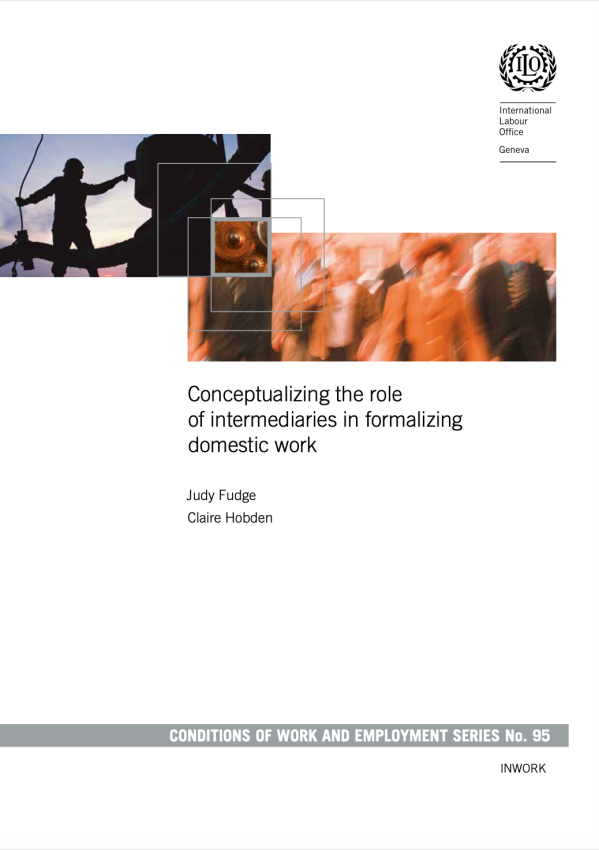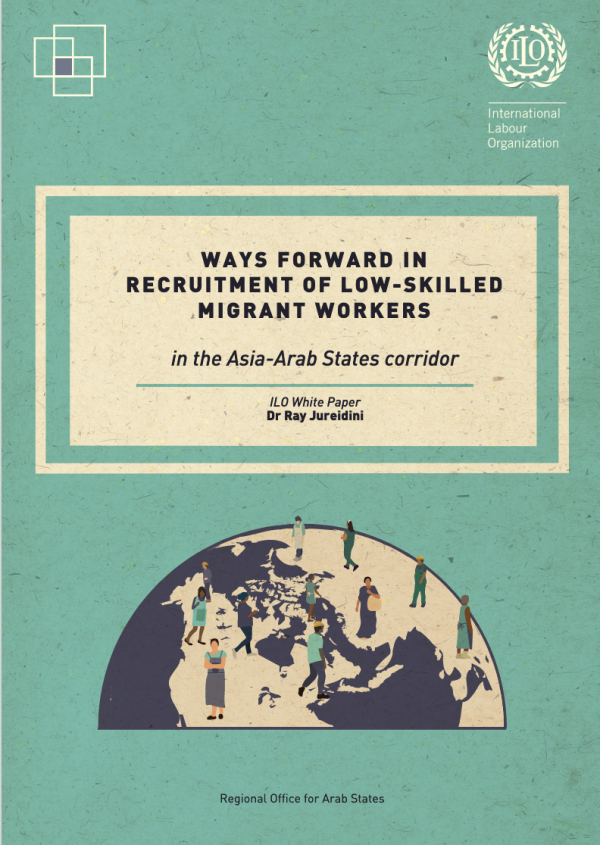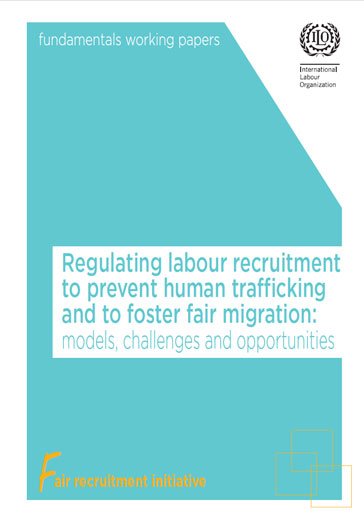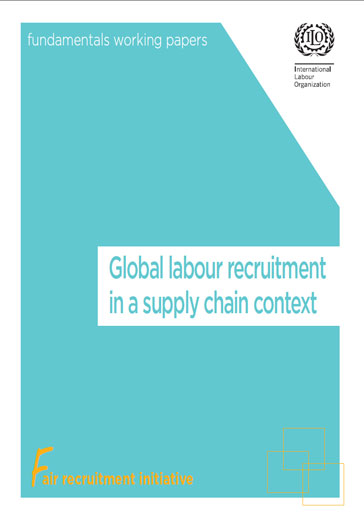Working Paper on Operational Parameters to Assess Fair Recruitment Practices
These parameters list a series of questions and issues that should be looked into in order to assess recruitment practices.
In South Asia, the pathways to jobs in domestic, garment or other similar sectors within the region or to the Middle East are intersected by various agents or contractors in an environment shaped by multiple rules and practices determining the mobility of aspiring workers especially women. The fluidity and segmentation of labour supply chains and labour regimes are such that none of the key stakeholders such as labour recruiters, regulators and even employers can guarante on their own a fair migration outcome for any workers. To do so requires understanding the specificity of recruitment processes from end to end and strong multi-stakeholder cooperation. The purpose of these operational parameters is to identify the main fields that need to be assessed and related questions when analyzing recruitment processes.
Type of document :
Country/Region : , , , ,
Year of publication :
Theme : , , ,
Plan de acción de la Procuraduría de los Derechos Humanos (PDH) para el abordaje integral de la migración laboral y contratación equitativa
Este plan de acción identifica elementos para contribuir a la institucionalización y coordinación de intervenciones sobre migración laboral y contratación equitativa desde un enfoque coordinado entre las distintas unidades de la PDH y desde el liderazgo de la Defensoría de Personas Migrantes.
Type of document :
Country/Region : , , , ,
Year of publication :
Theme : , , ,
Conceptualizing the role of intermediaries in formalizing domestic work
Domestic workers have long provided a range of services for families from cleaning and cooking to caring for children, the elderly and disabled, to driving household members and tending gardens. Despite the crucial services they provide, in many countries, domestic work is characterised by a high incidence of informal arrangements and contributes significantly to informality especially among women. The level of organization of the domestic work sector varies dramatically from country to country. In some countries, domestic workers are hired informally, by word of mouth, through social networks. In other countries, intermediaries – such as agencies, digital platforms, coops and others – play a role in recruiting, placing, and employing domestic workers. As the role of these intermediaries increases, questions arise about the impact intermediaries have on formalizing domestic work and providing decent work for domestic workers.
Type of document :
Country/Region :
Year of publication :
Theme : , , ,
For a fee: The business of recruiting Bangladeshi women for domestic work in Jordan and Lebanon
This working paper aims to shed light on the business models of labour recruiters that facilitate the recruitment of women from South Asian countries into domestic work in the Middle East, with a particular focus on Bangladesh, Jordan and Lebanon.
Focusing primarily on Bangladesh, Jordan and Lebanon, the study draws on 126 interviews conducted with key stakeholders, to analyse the recruitment ‘business model’ utilised by private employment agencies specialising on the domestic work sector.
Globally, the international recruitment industry is composed of an increasingly complex web of actors. In order to profit, private employment agencies must devise competitive strategies to generate income greater than the costs of selecting, processing and mobilising people into jobs. Such business models are dynamic and responsive to changes in market demands and skills’ availability.
The study also assesses the influence of national laws, policies and regulations on how private employment agencies conduct their business. By illuminating the factors that guide the actions of private employment agencies, the study aims to inform better policies and interventions to protect migrant domestic workers and eliminate abusive practices.
Type of document :
Country/Region : , , , ,
Year of publication :
Theme : ,
Ways forward in recruitment of 'low-skilled' migrant workers in the Asia-Arab states corridor
This White Paper serves to further stimulate policy dialogue for fair migration in the countries of origin and destination in Asia the Arab States corridor.
Type of document :
Country/Region : ,
Year of publication :
Theme :
Regulating labour recruitment to prevent human trafficking and to foster fair migration: Models, challenges and opportunities
This working paper presents the role of international labour standards in regulating recruitment and provides a preliminary overview of national laws, policies, regulations and enforcement mechanism which aim to prevent fraudulent recruitment practices and protect workers from unscrupulous labour recruiters. It aims to establish a framework and an initial baseline for the implementation of the second strategic pillar of the ILO’s Fair Recruitment Initiative – strengthening laws, policies and enforcement mechanisms to protect workers from abusive and fraudulent recruitment practices.
Overall, the paper addresses three main research questions:
- What are the main international labour standards with regards to labour recruitment and how have the ILO supervisory bodies assessed national regulation and its implementation?
- What are the different models and approaches to regulate labour recruitment? What are the most recent trends in terms of statutory regulation?
- How are private employment agencies monitored and how are statutory regulations enforced? What are the main challenges with regards to enforcement?
The paper also provides recommendations based on emerging national and regional experiences and identifies research gaps which should be tackled in the coming years.
Type of document :
Country/Region :
Year of publication :
Theme : , ,
Global labour recruitment in a supply chain context
This working paper discusses regulatory models and other measures available to stop abusive recruitment practices. It seeks to explain why the labour recruitment market operates as it does, and to propose responses that combat those market forces which create an environment conducive to abuse and fraud.
The paper suggests an approach that reshapes the market for recruitment services by engaging with employers in destination countries at the top of the labour supply chain, who could play a key role in influencing the recruitment business worldwide.
It presents several case studies through which this approach was tested through regulatory efforts, such as the Philippines, the Netherlands, the United Kingdom, several Canadian provinces; and in three agreements negotiated with employers by United States agricultural workers’ organizations to govern the terms of recruitment for migrant workers further down the chain.
This paper draws on these public and private sectors’ case studies to propose regulatory and market approaches that promote fair recruitment practices.
Type of document :
Country/Region : , , , ,
Year of publication :
Theme : ,
Subscribe to the Fair Recruitment Initiative Newsletter
Sign up to receive news delivered to your inbox.

